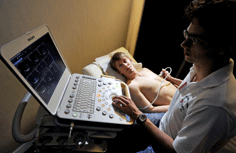General Information on Cardiac Screening
There is a simple way to diagnose most cardiac abnormalities. This is by having an ECG (electrocardiogram) test. Results should be read by a cardiologist. For extra clarity an Echocardiogram (ultrasound scan – right) can also be done.
If there has been a young (under 35) sudden death in the family, the family is entitled to be screened on the NHS.
Click here if you or anyone in your family (aged 14 to 35) would like to be screened
The European Society of Cardiology (ESC 2005) and International Olympic Committee (IOC) recommend cardiac screening for any young person taking part in competitive sport. Sport itself does not lead to cardiac arrest, but can trigger a sudden death by aggravating an undetected cardiac abnormality.
In countries such as Italy, screening participants in representative sports is mandatory. In some professions cardiac testing is also mandatory.
CRY offers subsidised ECG and Echocardiogram screening to all young people between the ages of 14 and 35. Click here for more details about CRY's Screening Clinics
SCREENING means having:
An Electrocardiogram (ECG), which looks at the electrical conduction pathways around the heart. Small stickers known as electrodes are placed on the client's chest and the wires connect to an ECG machine whilst you lie still. A printout of the hearts electrical activity is obtained for evaluation by the cardiologist. This test is painless, non-invasive and takes a matter of a few minutes to perform
An Echocardiogram (Echo) is an ultrasound test (such as offered to pregnant women) which looks at the structure of the heart. From the information provided on screen, measurements are taken which give a guide to muscle thickness and size of the chambers o the heart. Again, this test in non-invasive and painless and takes approximately 20 minutes to perform.
The tests are performed with the client lying down on a couch or bed. For both tests clients will need to be undressed to the waist.
For further details of the various cardiac tests including diagrams please go to cardiac tests
We recommend that screening is requested via your GP if there have been any young sudden deaths in the family. Or if there are symptoms of:
Chest Pain (exercise related)
Severe Breathlessness
Palpitations
Prolonged Dizziness
Fainting/Blackouts
If you are an elite athlete (represent your country in sport) we also recommend that you should consider screening. See Sports Cardiology
It must be emphasised that if a diagnosis of a cardiac condition is confirmed it can have serious implications with regard to Life Insurance and Mortgage Application for the individual.
Further information about innovative companies, providing intelligent systems for diagnostic, monitoring, and screening whom all support the work of CRY can be seen on the Medical Technology page.






